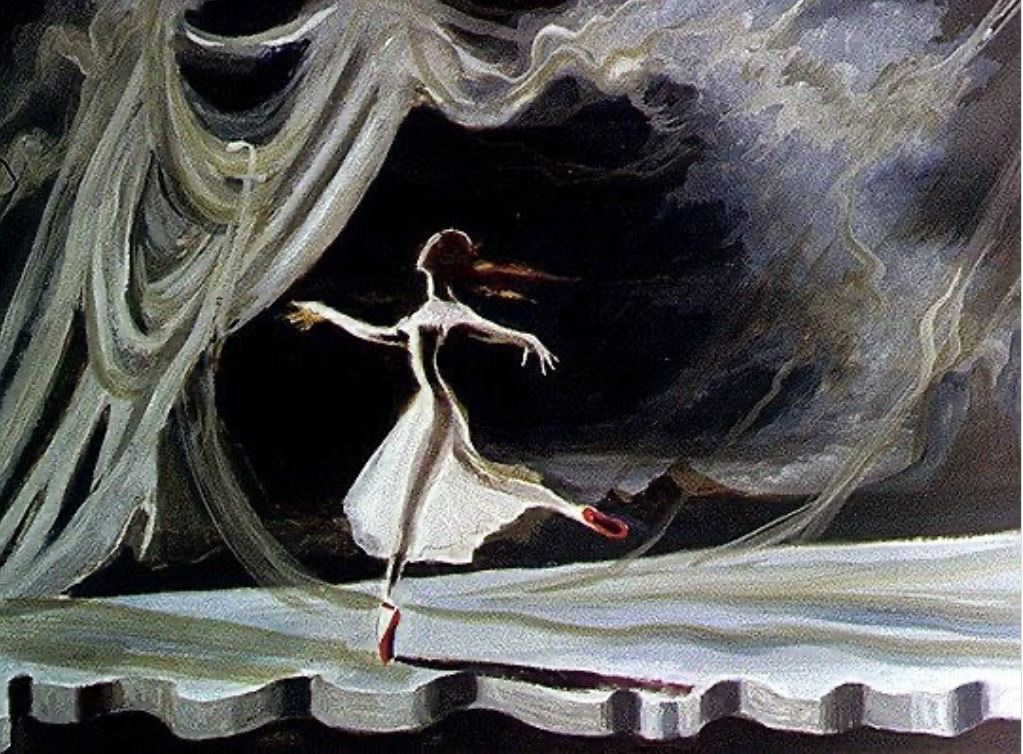The Red Shoes
by Evelyn Hooven (August 2025)

The gift I wanted for my fifteenth birthday was to go with two of my best friends to the moirehouse near Carnegie Hall, see the matinee film, and have an early supper after. The Little Carnegie was showing “The Red Shoes.” No trouble at all with permission. To our parents, an art film, ballet its focus, a cultural asset, and likely classic, was safety itself. Who would predict how strangely provocative it might turn out, the surprising complexity and weight?
The heroine is a ballerina deeply in love with a composer. They are young, both highly gifted. His work is to have its premier elsewhere. He wants, needs, for his beloved to join him. The impresario refuses to alter her schedule. Unbearably stricken, she runs from the stage mid-performance, desperate to overtake his train, she falls on the stones. “Take off the red shoes,” she says before she dies.
Here was an extreme reversal of safety—forbidden dedication to a calling, independent of reward, love that is ultimate—not to seeking death, but willing to risk it—what we might later call transcendence. Were we implicit exiles? How we loved our secret treasure, ours to protect, to keep from fading or departure. In a few minutes, a repeat showing. Our accord was swift, complete.
This wasn’t a popcorn moirehouse. With our supper money, we purchased mostly imported chocolates, some unfamiliar, exotic. We unwrapped them all, put them in pockets and purses, ready to give total attention to the second showing.
I got home only slightly later than expected but felt inwardly differentiated.
“Did you enjoy the moire, dear?”
A few of their friends had come to visit. I was glad for my “Yes” to remain unexplored.
“You must be very tired after your day.”
There was a collision within me of initiation and farewell—the reverse of fatigue—questioning that had tugged at me unacknowledged.
How was leaving meagre harvests, persecution, or war, with the hope of better luck, a sacrifice? Sacrifice was more ennobling than self-preservation, however valid. All this, done for our not-yet-born selves, incurred unpayable debt. And all that was asked as recompense—our gratitude and happiness.
I had been thinking that though I can’t do ballet, perhaps I could write about it—of theatres and cinemas, or even of festivals, sometimes far away. But—late hours, uncertain rewards might not qualify for the happiness they ordained. Would I have to say goodbye to the joy that had just stirred in me? Is it sacrifice to lose what one could never have?
Why did the domain accorded by them as happiness seem smaller than dreams of our own?
Table of Contents
Evelyn Hooven graduated from Mount Holyoke College and received her M.A. from Yale University, where she also studied at The Yale School of Drama. A member of the Dramatists’ Guild, she has had presentations of her verse dramas at several theatrical venues, including The Maxwell Anderson Playwrights Series in Greenwich, CT (after a state-wide competition) and The Poet’s Theatre in Cambridge, MA (result of a national competition). Her poems and translations from the French and Spanish have appeared in Parnassus: Poetry in Review, ART TIMES, Chelsea, The Literary Review, THE SHOp: A Magazine of Poetry (in Ireland), The Tribeca Poetry Review, Vallum (in Montreal), and other journals, and her literary criticism in Oxford University’s Essays in Criticism.
Follow NER on Twitter @NERIconoclast